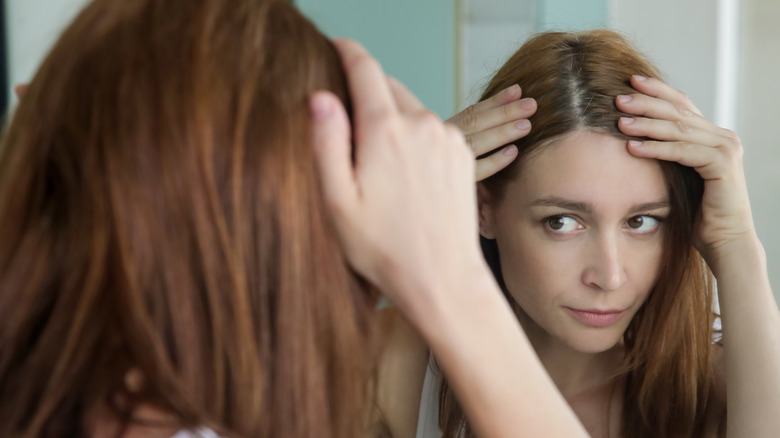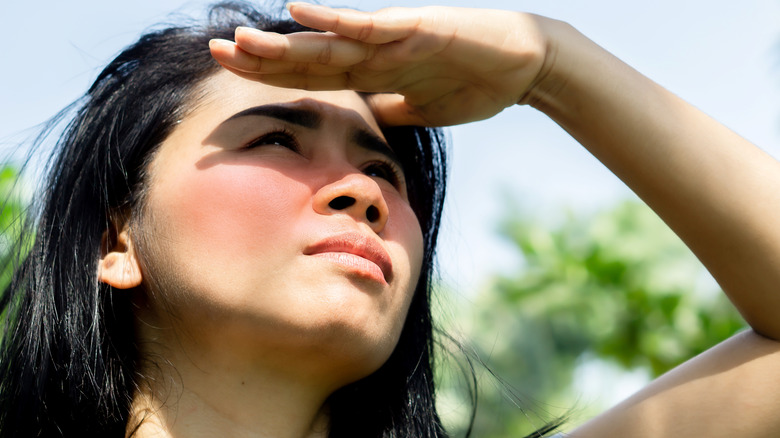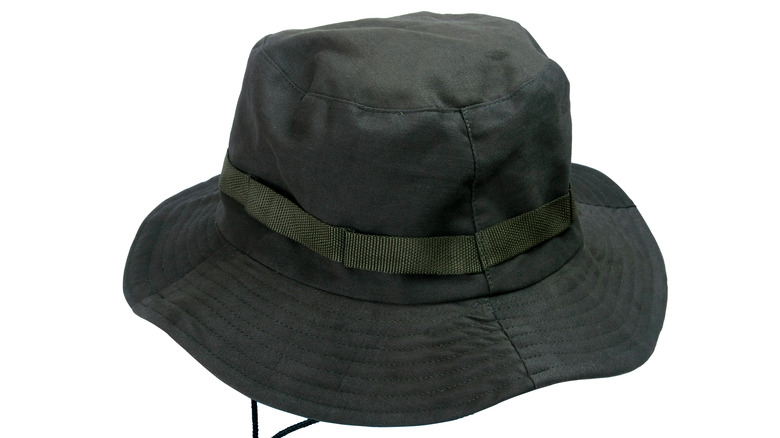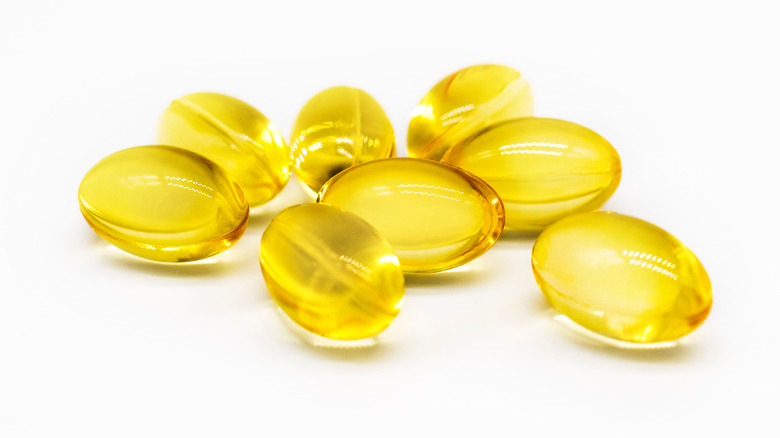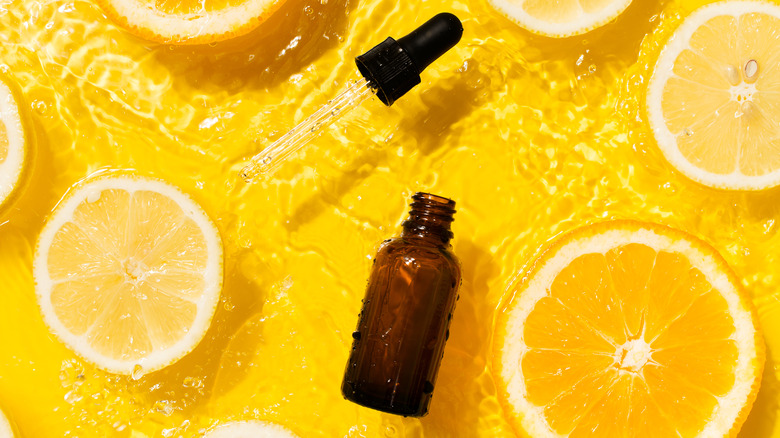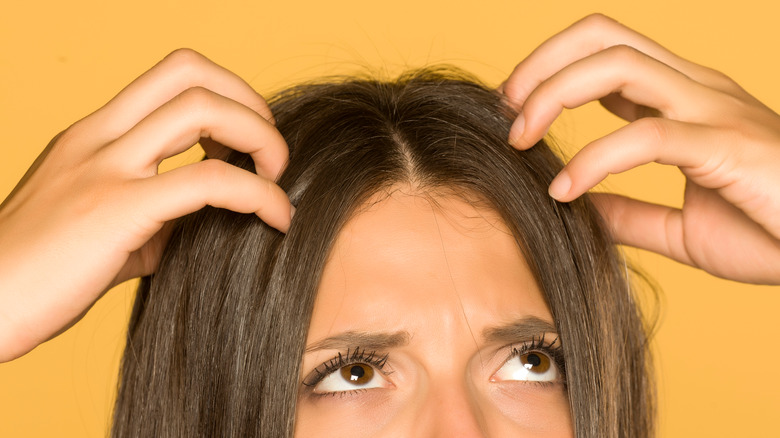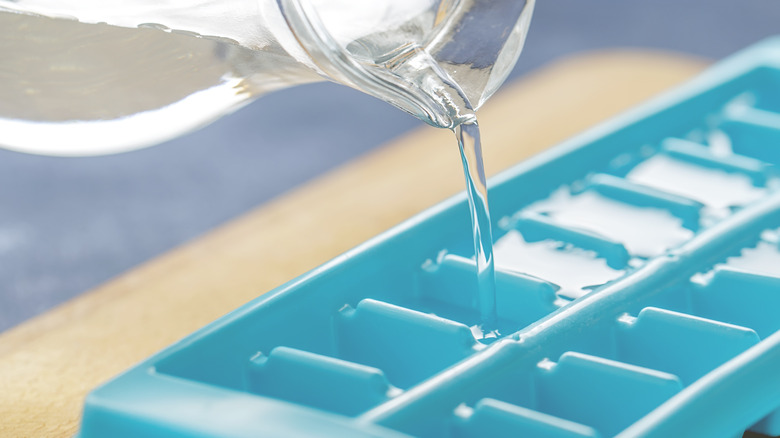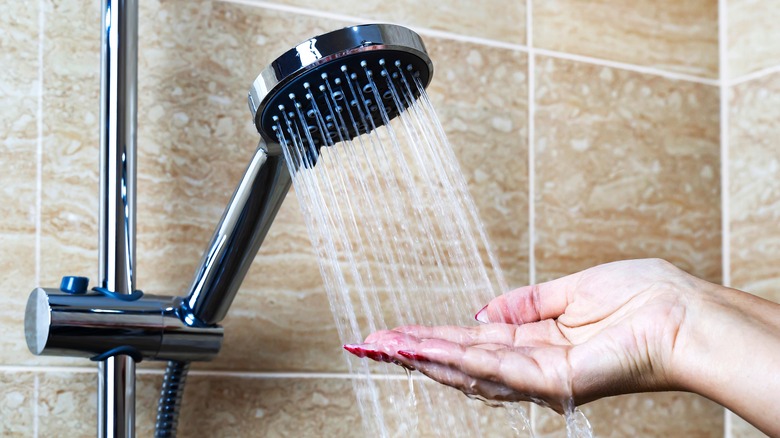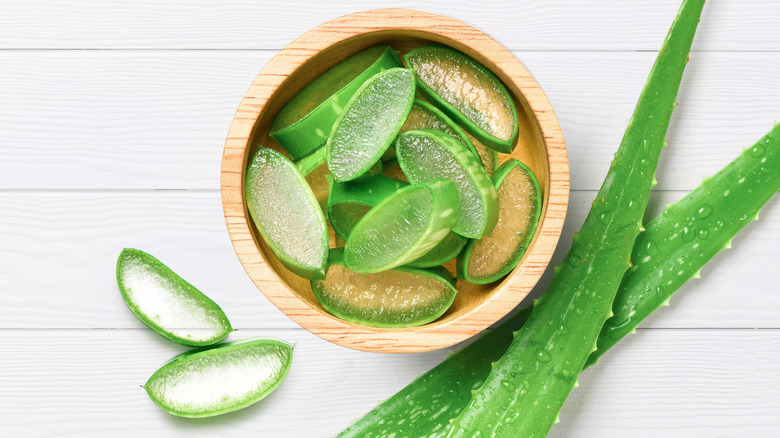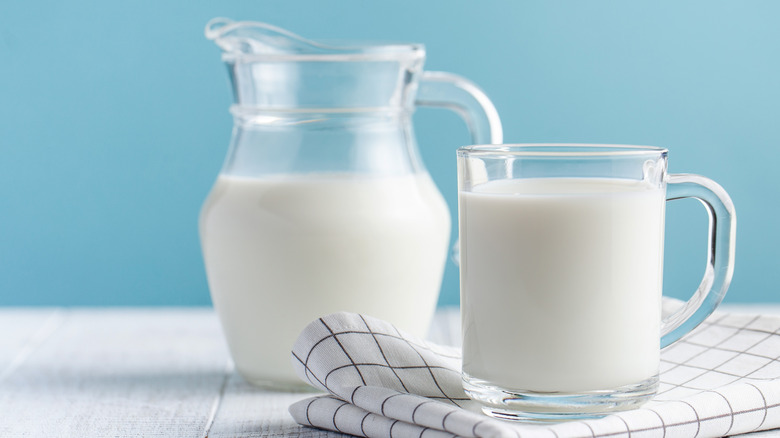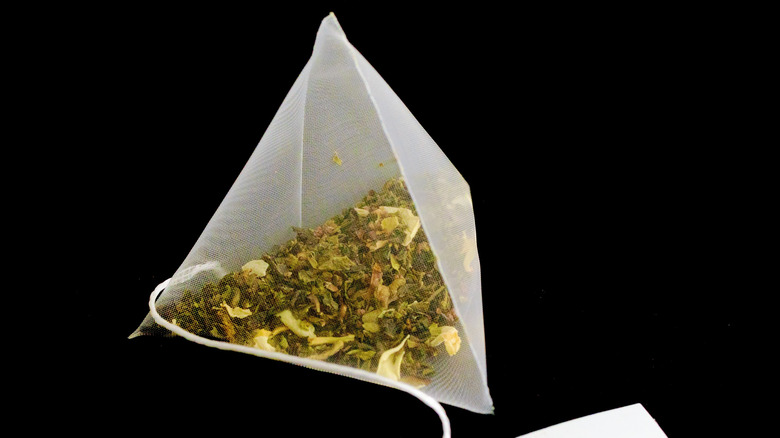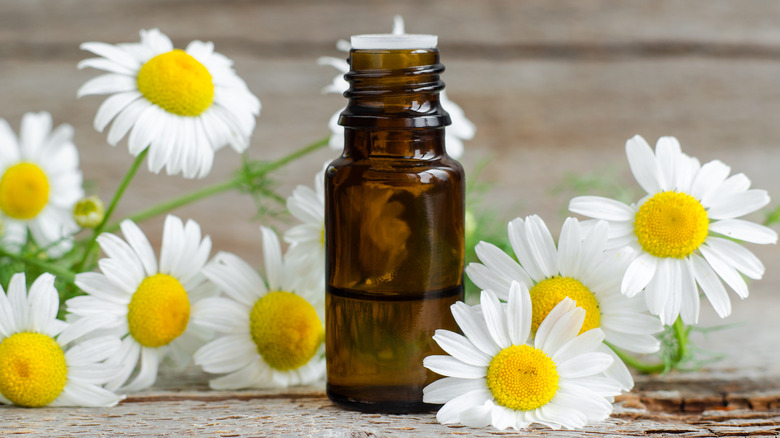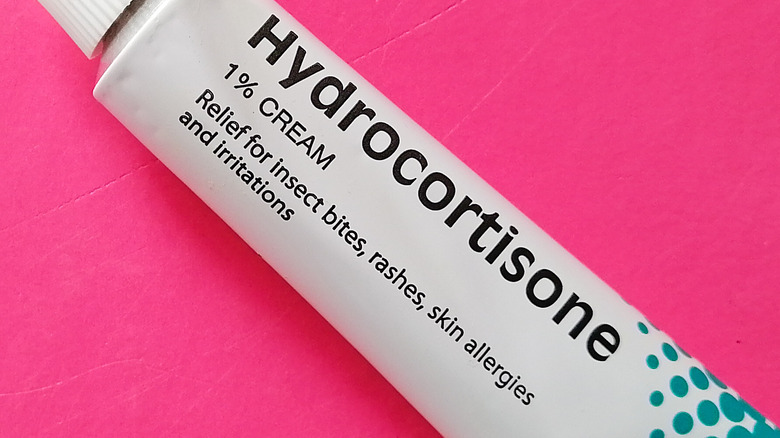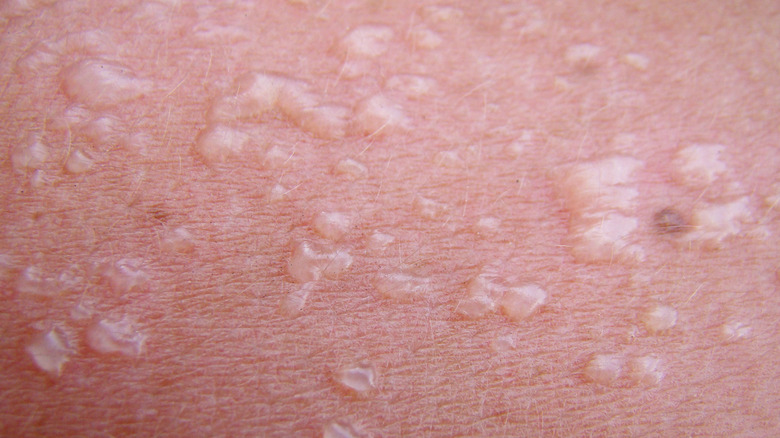How To Treat And Prevent A Sunburned Scalp
Think about the last sunscreen commercial you saw on television. In all likelihood, it involved people at a beach using a particular brand of sunscreen on their arms, legs, or face. But when was the last time you saw a product advertising that it protects your scalp from getting sunburned?
Even if it's not featured in many ads, scalp sunburns are a real health concern. As the Mayo Clinic explains, sunburnt skin can come with a variety of unpleasant symptoms, including inflammation, swelling, itchiness, pain, and even blisters. A person with a severe sunburn could also experience an elevated body temperature, nausea, fatigue, and headaches. Additionally, there is a connection between too much exposure to the sun and skin cancer.
Fortunately, there are some simple additions to a sun care routine that can help keep one's scalp protected. Additionally, there are ways to treat a sunburnt scalp and help it heal. However, one word of caution: Not all of these remedies and tips work for everyone. For instance, as WebMD notes, essential oils might not be good for children and elderly individuals, since both tend to be more sensitive to them. It's always a good idea to check with a medical professional before trying preventative or therapeutic treatments, especially if you're pregnant or breastfeeding.
Avoid going out when UV rays are at their worst
True or false: A person can't get a sunburn on a cloudy day. If you guessed "true," that's wrong — but don't feel bad, as it's a very common mistake. As the Environment Protection Agency (EPA) explains, just because there are clouds in the sky doesn't mean the sun's ultraviolet (UV) radiation can't reach you and potentially burn your scalp.
There's more than one type of UV ray, and not all of them reach Earth in the same amounts. For example, ultraviolet C (UVC) rays are usually 100% absorbed by the Earth's atmosphere (via EPA). On the other hand, the atmosphere only mostly shields us from UVB rays, so some do reach Earth's surface in varying amounts. These are the rays that are primarily responsible for sunburns, as well as other health problems like snow blindness. Additionally, both UVB and UVA rays (most of which do reach Earth) can cause other issues like skin aging and skin cancer.
Of course, we do need a certain amount of sunlight, not just because it can be psychologically beneficial, but also because it aids in our bodies' production of vitamin D, per EPA. With that said, limiting your time outside from 10 a.m. to 4 p.m. when roughly 50% of UV radiation reaches Earth can help protect you from not just sunburns, but also other UV radiation-related health issues.
Wear the right kind of hat
Let's be honest, not everybody likes wearing hats. For some, it's a fashion choice. For others, it might have to do with showing off their hairstyle. Speaking of which, someone with a full head of hair might assume their scalp is naturally shielded from the sun, and thus cannot get sunburned. But as the Skin Cancer Foundation points out, just because you have hair doesn't mean the top of your head is protected from the sun's UV rays.
Obviously, if a person has bald spots, those patches of skin are more vulnerable to UV rays. However, even if someone has no hair loss, they still can experience a sunburn if, for example, they have thin hair. Also, wherever someone parts their hair exposes that area of the scalp to the sun. The bottom line is that hair can't fully protect someone's head from UV radiation, but the right hat can really help lower your chances of developing a sunburn on your scalp.
According to the Skin Cancer Foundation, the best hats for sun protection are either bright or dark in color and made from such materials as unbleached cotton, wool, canvas, shiny polyesters, denim, lightweight satiny silks, or synthetic fibers. Also, look for hats that advertise they have an Ultraviolet Protection Factor (UPF) of 50+, since they'll block out the majority of the sun's rays.
You can use sunscreen on your head
While hair can't totally protect one's scalp from becoming sunburned, that doesn't mean hair doesn't offer any protection. Yes, it's not a completely effective shield, but it can still offer some shielding. However, even that can be a double-edged sword.
According to Well+Good, areas of the scalp that are usually covered by hair can be more vulnerable to the sun. Per dermatologist Dr. Heather Woolery-Lloyd, changing your hairstyle could expose parts of your scalp to more direct sunlight, which could lead to a sunburn. So, if you're trying out, for instance, a French braid or are just changing your hair's normal part, you might want to seriously consider using sunscreen on your scalp.
Of course, even if you're not changing your hairstyle, sunscreen can help keep your scalp from burning. Choosing the best one for your needs, however, can be a little tricky. As dermatologist Dr. Crystal Aguh explains to Well+Good, while spray-on sunscreens usually have chemical blockers that won't leave white residue in your hair, they also can have alcohol. Not only can this ingredient be bad for hair, but as Dr. Woolery-Lloyd notes, it can also dry out chemically treated hair. Dr. Aguh recommends only using sunscreen on your scalp when you're going to be in the sun for an extended period of time, and to wash your hair as soon as possible.
Vitamin E might help treat sunburns
Chances are you've heard of vitamin E. If you take a multivitamin, it probably includes this fat soluble vitamin (via WebMD). But that's not surprising, considering how important this vitamin is for so many of your organs to function properly. For all of its good points, though, there can be a little confusion when it comes to vitamin E and sunburns.
As Pelican Health explains, using vitamin E topically on the scalp can help protect it from the damage caused by UVB rays. (As the Environmental Protection Agency points out, both UVA and UVB rays can age one's skin.) But sunscreen can contain alcohol, which can be bad for one's hair, per Well+Good. And if you're thinking of just using vitamin E as sun protection to avoid hair issues, think again. While this vitamin can be helpful, it doesn't have the same protective capabilities as sunscreen. With that said, you might want to consider a sunscreen that contains vitamin E to give your skin one more layer of protection against the sun's rays.
Although vitamin E by itself isn't enough to keep your skin burn-free, it can help soothe a sunburn because it's an antioxidant (via Pelican Healthcare). Additionally, vitamin E can help undo skin aging by reducing inflammation, increasing elasticity and being generally beneficial for skin.
Vitamin C might help protect against UV rays
You'd be hard pressed to find someone who hasn't heard of vitamin C. Also known as ascorbic acid, this nutrient is touted on everything from orange juice to cough drops. And yes, it also might be a good addition to a sun care routine. However, there are a few things to keep in mind.
There's radiation in the sun's rays that our bodies absorb (via the Mayo Clinic), which can lead to our cells making harmful types of molecules called free radicals. However, vitamin C is an antioxidant; it can help protect the cells in your body from free radicals. And as Oregon State University explains, eating foods that contain vitamin C, as well as applying it to one's skin, might lead to healthier skin cells. Additionally, there has been research supporting vitamin C as both a preventative and therapeutic treatment for photodamage, which is when UV rays cause damage to the skin (via Oregon State University). For example, research in the Journal of the American Academy of Dermatology concluded that a combination of vitamins C and E can "reduce sunburn reaction."
While there are some potential pluses, vitamin C doesn't absorb UVA or UVB rays, so it's not something you should use in place of a sunscreen (per Oregon State University). And more research is needed into its potential skin benefits. Also, according to Medical News Today, some individuals can have a reaction to vitamin C serum.
Don't scratch or peel a sunburned scalp
If you've ever had a sunburn on your scalp, you know that it can be itchy and painful. However, most of the time, both of these symptoms aren't severe, ranking as more of an annoyance than a major problem. That is, unless you're one of the unfortunate souls to develop a condition known informally as "hell's itch."
As dermatologist Dr. Melissa Piliang told the Cleveland Clinic, hell's itch is a "deep, painful, almost throbbing, itch" that occurs up to three days post-sunburn. How bad could it be? Dr. Piliang recounted that people with this health issue said it was "like fire ants are biting you under the skin" and that when they scratched their skin, they experienced "stabbing pain." Unsurprisingly, Dr. Piliang advises against scratching one's sunburn if you have hell's itch, not only because scratching can worsen the symptoms, but also because scratching can break the skin, which "can be a portal of entry for bacteria and could lead to infection."
Even if you don't have hell's itch, you might be tempted to scratch or peel a sunburn, especially if it's on your scalp. But according to Reliant Medical Group, that not only hinders your sunburn's healing, but also potentially damages your skin and increases your chances of developing an infection. They also recommend carefully cutting away dead skin that's dangling with a scissors rather than pulling it off your body.
Apply a cold compress
Imagine this: You've just come home from a long day at the beach, when you realize your scalp got sunburned. Unfortunately, it's too late in the evening to go out and buy medication or other topical treatments for your burn. Fortunately, there's an easy way to MacGyver up a temporary solution.
As Healthline explains, a cold compress can soothe a sunburned scalp. And you only need a few simple items to make one, all of which are commonly found in people's homes, anyway. According to Healthline, you want to either put ice cubes in a plastic bag or use a bag of frozen food (preferably something small, like peas). If you don't have either, then soak a towel in water, put it in a sealable plastic bag, and place it in a freezer for 15 minutes. Next, dampen a washcloth with cold water and wrap it around the frozen food bag or the bag containing the ice or towel. Voilà, you have a homemade cold compress that you can place on your sunburned scalp.
While it's easy to make a cold compress, there are a few precautions about using one. According to Healthline, you should only keep a cold compress on your skin for no longer than 20 minutes. Also, never put ice directly against your skin. Finally, if you have a severe sunburn, don't hesitate to seek medical help, even if it's late in the evening.
Adjust your showering and hair care routine
Arguably, nothing is more relaxing than a nice, long, hot shower. It's not just soothing; psychologically, it can feel like you're washing away the stresses and problems of the day. However, if you have a sunburned scalp, hot showers are one of the things you might have to forgo for a while.
According to the Skin Cancer Foundation, cool showers rather than cold or hot ones are best for sunburned skin. You also don't want to stay in the shower too long (even if it's at the right temperature) since that can wind up drying out your skin. Also, what you use in the shower makes a big difference. As Healthline explains, shampoos that contain sulfates and conditioners that have dimethicone can both be bad for a sunburned scalp. And of course, harsh soap is a no-no for sunburned skin in general.
Once you're done with your shower, put a moisturizing lotion that doesn't contain petroleum or oil-based ointments on your wet scalp to help it heal (via the Skin Cancer Foundation). And if you use hair products to get your perfect style, you'll probably need to do without them (or at least cut down on them) until your sunburn heals. As Healthline notes, these products can contain chemicals that could make your sunburned scalp more irritated. You also shouldn't use flat irons or blow dryers until your scalp is fully healed.
Aloe vera might help soothe a sunburn
They say money doesn't grow on trees, but sunburn relief might grow on a type of plant. As GoodRx explains, the aloe vera plant's leaves contain a gel that has been touted for its ability to soothe a sunburn. But before you rush out to the store to buy any cream or ointment that lists aloe under its ingredients, there are a few things you should know.
Aloe vera contains mucopolysaccharides, which might help a sunburn retain moisture. It can also create a cooling sensation when used topically that might help soothe a mild sunburn. But with all that said, there isn't clinical evidence directly proving that aloe vera is an effective treatment for sunburns. Of course, that doesn't mean you won't find aloe vera products you can use, but they aren't tested and regulated the same way that products designated for medical conditions are. In fact, in 2016, Bloomberg News found that even if a product lists aloe vera as one of its ingredients, it might contain maltodextrin instead of the plant.
The bottom line is: If you want to try aloe vera on a sunburned scalp and don't own an aloe vera plant, you need to be a conscientious consumer. A couple tips from GoodRx include opting for products that contain certified organic aloe and list pure aloe vera as one of their first three ingredients.
Some items in your fridge or pantry might help
Just as you can improvise and use frozen food to make a cold compress (via Healthline), there are other items in your kitchen that might help soothe a sunburn. But be careful — one common food that's sometimes recommended online for sunburns could actually do damage, per Insider.
According to St. Luke's Health, milk can help reduce inflammation and safely remove dead skin cells from the surface of a sunburn. To apply the milk on your scalp, St. Luke's recommends placing a washcloth in a bowl of milk and putting it in the fridge until cool. This way, when you put the washcloth against your scalp, the coolness will help soothe your skin. Another item you might want to consider is honey, since it can help moisturize a sunburn, as well as make it less inflamed. And if you've heard oatmeal can also help with sunburns, you're right — although the kind St. Luke's recommends, colloidal oatmeal, is typically found in skin products and lotions rather than in one's pantry.
While milk, honey, and colloidal oatmeal might all be good for a sunburn, Insider warns that using vinegar to treat sunburns is both ineffective and unsafe. Dermatologist Dr. Carol Cheng told Insider that applying vinegar to a sunburn could increase inflammation and pain, as well as slow the healing process and result in "a serious chemical burn."
Green tea oil or bags might help
Usually, when most people think of green tea, the first thing that comes to mind is a beverage like matcha. However, green tea is also an essential oil. It's important to point out that so far, we don't have definitive proof that essential oils do help with sunburns (per Healthline). And you should always speak with a healthcare professional before using essential oils in general, since they might not be safe for certain individuals like infants and children, as well as women who are pregnant or breastfeeding.
With that said, research in the Journal of the American Academy of Dermatology found that the polyphenols in green tea might help protect skin from the radiation found in sunlight, as well as help a sunburn heal. Polyphenols are found in a number of plants and have antioxidant properties, per the National Cancer Institute. Additionally, dermatologist Dr. Katie Beleznay told Women's Health Magazine that antioxidants found in tea (as well as another substance called tannin) might help reduce the inflammation of a sunburn.
Although green tea essential oil can be an option for a sunburned scalp, so are teabags. Simply soak or brew them, let them cool off, and place them against the skin for a few minutes. And of course, if you have a negative reaction to the teabags, don't leave them on your skin.
Roman chamomile might help, but avoid if you're pregnant
A word that probably comes to mind when you hear "chamomile tea" is "soothing." And yes, Roman chamomile might help soothe a sunburned scalp (via Healthline). However, not everyone should use it.
According to Healthline, Roman chamomile in essential oil form could be a useful treatment for sunburns, but there are some important guidelines for using it. These include diluting first and never ingesting it. A small amount of the oil can be added to a cool bath to help with sunburned skin. Also, sunburns can be stressful, but Roman chamomile oil as an aromatherapy treatment can be mentally and emotionally soothing. The scientific community is still researching essential oils, though, so the jury is out on their effectiveness.
Although Roman chamomile might sooth a sunburn, WebMD warns that pregnant women might experience a miscarriage if they ingest it. The site even advises against using Roman chamomile in any form if someone is pregnant, including topically and as aromatherapy. Additionally, someone who is breastfeeding or allergic to certain plants might want to avoid Roman chamomile. Lastly, essential oils can be bad for infants, children, and the elderly, per WebMD.
Ask a medical professional about hydrocortisone cream
While there are a number of home remedies for a sunburned scalp, that doesn't mean there aren't topical medicines that can also help. A common one recommended for sunburns is hydrocortisone cream (via the Mayo Clinic). But it can cause side effects and might be bad for certain individuals (per MedlinePlus).
Although hydrocortisone is available in creams, it's also found in sprays, lotions, ointments, and solutions. And yes, it can help with sunburn symptoms like itchiness, redness, and swelling. However, if you have diabetes or Cushing's syndrome, are pregnant, or are planning to become pregnant, you should let a medical professional know before using hydrocortisone in any topical form. In addition, if you become pregnant while using hydrocortisone, you should contact your doctor right away, as hydrocortisone can affect a child's growth and weight.
Even if you don't fit any of the above scenarios, it's still possible to have a reaction to hydrocortisone. Ironically, a person treating a sunburn with hydrocortisone might experience redness, burning, itching, dryness, and irritation. Other side effects can include a rash (which can be severe), acne, bumps that are either white or red, unwanted hair growth, and changes in skin color. If you do have a reaction to hydrocortisone (and especially if it's severe), reach out to a medical professional right away.
Don't break blisters from a sunburn
One of the reasons why a sunburn on the scalp or otherwise can be unpleasant is because sometimes, blisters form, per Marist College. But these small, fluid-filled bumps are more than just an annoyance (via Medical News Today). In fact, if you develop them, then your sunburn is a second degree burn. And unfortunately, the bad news doesn't stop there.
According to Medical News Today, sunburn blisters might not appear until as long as 24 hours after someone is sunburned. When they do show up, however, they are typically itchy and painful, via Marist College. And even after they heal (which typically takes about a week), they can leave behind spots, which are actually scars that could remain for as long as 12 months after getting sunburned.
As unpleasant as they can be, however, the American Academy of Dermatology Association points out that blisters are your body's way of helping your skin heal. In fact, if you break blisters, you're more likely to develop a bacterial infection, per Medical News Today. Also, if you have a severe sunburn (and if you have blisters, you probably do), you also could experience dehydration, nausea, vomiting, dizziness, elevated body temperature, and chills. But even if you don't have blisters, you should still seek medical help if you're experiencing any of these symptoms.

